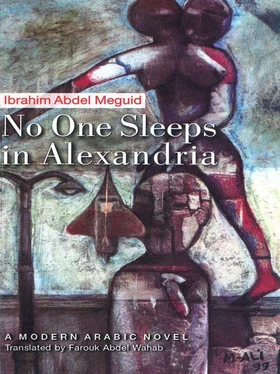Talk would also turn to the new corpses, often of little girls, that began to appear in the Mahmudiya canal, or to the many new foundlings noticed wrapped in old rags and lying on the bank between the Raghib and Karmuz bridges, their cries barely heard by a passer-by or by someone out for a ride in a small rowboat. Usually such foundlings were handed over to the government, which placed them in orphanages. A few of them lived; the others died of neglect.
“But God is capable of protecting them — maybe one of them will grow up to be famous, a singer or a ruler. Men with unknown origins, the ones they called Mamluks, ruled our country. Maybe they found them abandoned near the canals like that.”
Laughing, Umm Hamidu then asked Zahra if she had seen the soldiers of the Territorial Army stationed on guard duty around the mill, the bridge, and the police precinct. “The poor cripples, lepers and one-eyed men — the best among them is no better than a club-foot. They’d come to me and play all kinds of games and maneuvers just to buy a millieme’s worth of tangerine. I take pity on them. One of them is very cute, he comes here and sings to me.” Umm Hamidu’s mounds of flesh shook as she laughed. “He really sings and moves his shoulders like a dancer: Ό tangerine vendor, please tell me how much for ten.’ I look at him and laugh and give him a tangerine for free. The next day and the next he’d come and dance and sing and so on until one day, I shook my shoulder as I told him ‘Ten tangerines, darling, cost ten piasters.’ He laughed and that made me laugh, and now because he’s my friend, he asks me how I am every day. He told me that he didn’t want to go back to his village after the war, that he wanted to live in Alexandria. He asked me to marry him, I swear, I told him, why do you want to marry a woman who can hardly move? Why do you want to bury yourself alive? But he wasn’t convinced. He comes and sings to me everyday and says that he’s patient and will get his heart’s desire.”
Umm Hamidu expressed surprise at the German and Italian raids against Alexandria, guarded as it was by the Territorial Army, which could not fight an ant. “They should have pity on them and send them food,” she reasoned.
Umm Hamidu never missed a chance to talk about the scandalous police behavior in Kom Bakir, Attarin, Mina al-Basal, Mahamil, and Marsilya Street. She noticed that Zahra was not particularly fond of that line of talk, especially after.she heard it the first time. But Umm Hamidu loved to discuss it, if only briefly. She would tell her about the many respectable families whose daughters went to those places during the day, then went back home, chaste and honest for all intents and purposes, and about the many poor women whose men sent them there also, “Filthy men.” There were also widows that sold themselves rather than marry, so they could raise their children alone. That was, of course, in addition to the divorcees and peasant girls who had run away from home. “The whole country is throwing women at Alexandria these dark days, when it’s filled with soldiers from the white world and the black world.” She told her that Hamidu, her son who worked as a shoeshine boy in Rami station, Manshiya, Bahari, and Attarin, came to her with stories that would make one’s hair turn gray, about the women, the soldiers, and all the foreigners. Hamidu was always upset at what he saw, and he did bad things to the English. “He’ll either end up dead or banished to Mount Sinai.” Zahra asked her where Mount Sinai was, and she said it was in the faraway place where they banished criminals. Zahra, who still had not learned where Mount Sinai was, fell silent. Umm Hamidu asked her once if she had noticed how in the Rashidi family, which lived in the house next to Khawaga Dimitri’s, the men were very short and the women very tall. “Each woman needs two men, end to end, one to kiss her and the other to fuck her. Why aren’t you laughing?” she asked Zahra, who was always shocked at the audacity of this fat woman who seemed, as she sat there, as if she had been planted, who seemed not to be able to stand up, as if her waist and huge posterior were part and parcel of the earth.
Zahra was even more surprised that she was so fascinated by what Umm Hamidu had to say. Zahra told her only one story, about the raid that took place the previous month and how her husband Magd al-Din and his friend Dimyan, when they ran to Karmuz to help with the rescue, found Lula in the rubble suffering from a severe injury. Umm Hamidu, who looked genuinely sorry, said that Lula was a poor woman who had not run away with her lover, but that her husband, the accordion player, was a pimp, that she had heard about her fame the last few months in the mansions of the pashas and hoped to see her, but God’s will was done. She said that she herself had worked for some time with the troupe of Naima al-Saghir in Bahari. “A dancer?” Zahra asked in surprise. Umm Hamidu realized why she was so surprised, for who has ever heard of a fat dancer who cannot get up off the ground all day? She said no, that she was a dresser, and explained to her how she used to dress Sitt Naima al-Saghir for singing and dancing, and for the pashas’ parties. Sitt Naima, she told her, had a short fuse. Every time she met a movie producer, she asked him to find her a role in a movie, and he would promise, but not deliver. So Sitt Naima took it out on her helpers, and Umm Hamidu left her service.
She talked to Zahra about the world of the awalim, the singing and dancing women. She told her that the piazza where Lula died was their headquarters in Alexandria. There were the artists’ cafés, the houses of impresarios and leaders of the troupes, and the ‘workshops for teaching singing and dancing girls. Any girl who in away went to the piazza, for dancing was more honorable than prostitution, and, “as the proverb says, ‘Every bean finds her measurer.’ But the awalim say, ‘Every dancer finds her drummer. The dancer always marries a drummer or a tambourine player, seldom an accordionist or some other instrument — those love the singers. Each leader of a troupe has her own girls and her turf. So Naima al-Saghir, for instance, cannot enter Karmuz — Bata al-Salamuni would kill her — and so on. And now, after the movies, each dancer wants to be another Hikmat Fahmi, and every dancer who used to dream to dance in the corniche nightclubs is now dreaming to dance in front of the king. King Farouk is a handsome man whose face is as beautiful as the full moon; all the dancers are in love with him and women hunger for him! “
Then Umm Hamidu takes her spiel in a different direction. “Alexandria is a happy city, and its earth is saffron, as people say. They say that Alexandria was built by a crazy man named Alexander who filled it with wineries, and people danced and sang all day and night and cavorted with women. To this day they still find relics of Alexander and ancient Alexandria, just like they find treasures under collapsed houses after the air raids. After every raid the rescue workers find a lot of money and gold and jewelry under the rubble. They once found a clay vessel filled with gold coins stamped with the name of the Greek queen Naisa, who ruled Alexandria a long time ago. Yes, that’s why they call the area Mount Naisa, because the queen lived there. They say she was a mighty queen, so the folks who live in Mount Naisa are mighty drug dealers and robbers that the government can’t do anything about. In front of Mount Naisa on one side is the piazza, and on the other side Pompey’s Pillar. The piazza is a very old neighborhood, and Pompey’s Pillar is even older. It’s surrounded by Kom al-Shuqafa, which has catacombs underground where the Nubians and Sudanese live. These Nubians and Sudanese spend their days selling seeds and peanuts, and at night they sleep in the caves like bats. The caves are full of relics known only to those blacks and to the gypsies. The gypsies also live there, but since the war started, nobody sees them on the streets any more. Where did they go? God only knows!”
Читать дальше












